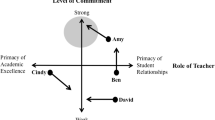Abstract
The purpose of this study was to examine preservice classroom teachers’ (PCTs) identity development as teachers of physical education (PE) in a methods course designed based on the thematic framework of learning to teach (Feiman-Nemser 2008). Ten PCTs (four male, six female) were selected, and data were collected from PCTs’ reflective journal entries, as well as individual interviews with participants. Inductive analysis of data revealed that PCTs’ identity as elementary PE teachers has been changed: (a) from a sport coach to a movement educator, (b) from a recess organizer to a curriculum implementer, and (c) from a classroom teacher to school-wide physical activity teacher. These changes have been facilitated by the teacher educator’s modeling behaviors, micro-teaching practice, and reflection combined with metaphor development in regard to the teaching and the teacher. This study highlights the important role of a methods course to help PCTs transform diverse learning experiences into legitimate sources of knowledge for their own identity development.
Similar content being viewed by others
References
Aleccia, V. (2011). Walking our talk: The imperative of teacher educator modeling. The Clearing House, 84, 87–90.
Alsup, J. (2006). Teacher identity discourses: Negotiating personal and professional spaces. Mahwah, NJ: Lawrence Erlbaum Associates.
Avraamidou, L. (2014). Tracing a beginning elementary teacher’s development of identity for science teaching. Journal of Teacher Education, 65, 223–240.
Beauchamp, C., & Thomas, L. (2009). Understanding teacher identity: An overview of issues in the literature and implications for teacher education. Cambridge Journal of Education, 39, 175–189.
Beijaard, D., Meijer, P. C., & Verloop, N. (2004). Reconsidering research on teachers’ professional identity. Teaching and Teacher Education, 20, 107–128.
Canzoneri, P., & Diakiw, J. (2000). Personal history inquiry. In A. L. Cole & J. G. Knowles (Eds.), Researching teaching: Exploring teacher development through reflexive inquiry (pp. 27–46). Boston: Allyn and Bacon.
Connelly, F. M., & Clandinin, D. J. (1999). Shaping a professional identity: Stories of educational practice. London, ON: Althouse Press.
Coulter, M., Marron, S., Murphy, M., Cosgrave, C., Sweeney, T., & Dawson, G. (2009). Teaching PE: The central role of the class teacher. Intouch, 102, 39–41.
Creswell, J. W. (2012). Qualitative inquiry and research design: Choosing among five approaches. Thousand Oaks, CA: Sage Publication.
Dam, G. T. M., & Blom, S. (2006). Learning through participation: The potential of school-based teacher education for developing a professional identity. Teaching and Teacher Education, 22, 647–660.
Feiman-Nemser, S. (2008). Teacher learning: How do teachers learn to teach? In M. Cockran-Smith, S. Feiman-Nemser, D. J. McIntyre, & K. E. Demers (Eds.), Handbook of research on teacher education: Enduring questions in changing contexts (3rd ed., pp. 697–705). New York: Routledge.
Fletcher, T., & Mandigo, J. (2012). The primary schoolteacher and physical education: A review of research and implications for Irish physical education. Irish Educational Studies, 31, 363–376.
Fletcher, T., Mandigo, J., & Kosnik, C. (2013). Elementary classroom teachers and physical education: Change in teacher-related factors during pre-service teacher education. Physical Education and Sport Pedagogy, 18, 169–183.
Flores, M. A., & Day, C. (2006). Contexts which shape and reshape new teachers’ identities: A multi-perspective study. Teaching and Teacher Education, 22, 219–232.
Garrett, R., & Wrench, A. (2007). Physical experiences: Primary student teachers’ conceptions of sport and physical education. Physical Education and Sport Pedagogy, 12, 23–42.
Hammerness, K., Darling-Hammond, L., & Bransford, J. (2005). How teachers learn and develop. In L. Darling-Hammond & J. Bransford (Eds.), Preparing teachers for a changing world: What teachers should learn and be able to do (pp. 358–389). San Francisco: Jossey-Bass.
Hardman, K. (2008). Physical education in schools: A global perspective. Kinesiology, 40, 5–28.
Harlow, A., & Cobb, D. J. (2014). Planting the seed of teacher identity: Nurturing early growth through a collaborative learning community. Australian Journal of Teacher Education, 39, 70–88.
Harris, J., Cale, L., & Musson, H. (2012). The predicament of primary physical education: A consequence of ‘insufficient’ ITT and ‘ineffective’ CPD? Physical Education and Sport Pedagogy, 17, 367–381.
Kerby, A. (1991). Narrative and the self. Bloomington, IN: Indiana University Press.
Korthagen, F. A. (2004). In search of the essence of a good teacher: Towards a more holistic approach in teacher education. Teaching and Teacher Education, 20, 77–97.
Lee, O., & Choi, E. (2013). Utilizing peer coaching to facilitate pre-service physical education teachers’ reflection. The Asia–Pacific Education Researcher, 22, 147–154.
Maclean, R., & White, S. (2007). Video reflection and the formation of teacher identity in a team of pre-service and experienced teachers. Reflective Practice, 8, 47–60.
Morgan, P., & Bourke, S. (2008). Non-specialist teachers’ confidence to teach PE: The nature and influence of personal school experiences in PE. Physical Education and Sport Pedagogy, 13, 1–29.
Morgan, P. J., & Hansen, V. (2008). Classroom teachers’ perceptions of the impact of barriers to teaching physical education on the quality of physical education programs. Research Quarterly for Exercise and Sport, 79, 506–516.
Olsen, B. (2008). Reasons for entry into the profession illuminate teacher identity development. Teacher Education Quarterly, 35, 23–40.
Placek, J. (1983). Conceptions of success in teaching: Busy, happy, and good? In T. Templin & J. Olson (Eds.), Teaching in physical education (pp. 46–56). Champaign, IL: Human Kinetics.
Sachs, J. (2005). Teacher education and the development of professional identity: Learning to be a teacher. In P. Denicolo & M. Kompf (Eds.), Connecting policy and practice: Challenges for teaching and learning in schools and universities (pp. 5–21). Oxford: Routledge.
Whitehead, M. (2013). What is the education in physical education? In S. Capel & M. Whitehead (Eds.), Debates in physical education (pp. 22–36). Abingdon: Routledge.
Wrench, A., & Garrett, R. (2012). Identity work: Stories told in learning to teach physical education. Sport, Education, and Society, 17, 1–19.
Zembylas, M. (2003). Emotions and teacher identity: A poststructural perspective. Teachers and Teaching: Theory and Practice, 9, 213–238.
Author information
Authors and Affiliations
Corresponding author
Rights and permissions
About this article
Cite this article
Lee, O., Jo, K. Preservice Classroom Teachers’ Identity Development in Learning to Teach Physical Education. Asia-Pacific Edu Res 25, 627–635 (2016). https://doi.org/10.1007/s40299-016-0290-5
Published:
Issue Date:
DOI: https://doi.org/10.1007/s40299-016-0290-5




